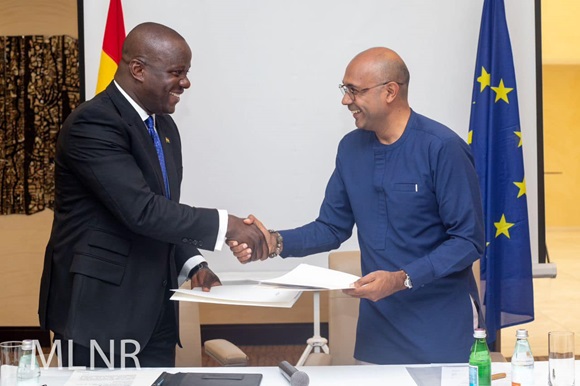The government has signed a deal with the European Union to make Ghana the first African country to issue Forest Law Enforcement, Governance and Trade (FLEGT) licenses.
This agreement is set to commence on June 30, 2025.
The deal, which was signed and unveiled at the 12th session of the Ghana-EU Joint Monitoring Review Mechanism of the Voluntary Partnership Agreement (VPA) in Accra on Wednesday, November 6, 2024, marks a significant milestone in the sustainable management of Ghana’s timber resources.
The signing of the FLEGT agreement, which signifies the conclusion of years of exhaustive and comprehensive stakeholder engagements, not only confirms Ghana’s readiness to trade and promote legal timber products but also affirms the country’s openness to serve as a model for other countries that want to pursue the path towards issuing FLEGT licenses.
In his remarks, the Minister for Lands and Natural Resources, Samuel A. Jinapor, commended all the persons and organisations whose commitment and dedication culminated in Ghana's confirmation as the first country in the world to issue FLEGT licenses.
The MP described the development as the outcome of productive discussions and deliberations geared towards the transparent, accountable, and sustainable management of the country’s forest resources.
Highlighting key aspects of the Aide Memoir, the Minister stated that the document provides an effective roadmap and guide for the management of the country’s forest reserves and also provides the foundation for the growth of Ghana’s economy through the trade of legal timber products.
He noted that the document also provides a detailed plan for tackling illegalities in the industry.
“We came together not only to review our progress but also to reaffirm our shared goals and aspirations for the future. The Aide Memoire we are signing today encapsulates the key outcomes of our discussions and serves as a roadmap for future actions."
"It underscores our commitment to enhancing transparency, accountability, and the sustainable management of our forest resources. We are united in our belief that good governance is essential not only for environmental protection but also for the well-being of our people and the resilience of our economies”, he stated.
“We can celebrate this milestone because, as outlined in the agreement, the established systems have undergone a thorough assessment by external auditors, and all identified corrective actions have been duly resolved. This resolution encompasses both the technical foundations of the system and the more complex policy measures that engage the highest levels of our country’s governing structures”, he added.
At this significant milestone, it is important to recognize the support and efforts of everyone who has worked tirelessly and with a visionary purpose to bring this initiative to life. The signing of this Aide Memoire is a testament to our collaborative efforts, reflecting the dedication and hard work of all parties involved in this important initiative.
Permit me to also acknowledge the United Kingdom, which was the member state partnering with Ghana prior to Brexit. Through development cooperation with the UK, Ghana received grant funding to develop its technical systems, establish multi-stakeholder deliberative platforms, train forest auditors, and implement the independent auditing requirements under the agreement. The significance of this contribution cannot be overstated.
Let me extend my heartfelt gratitude to our partners in the European Union for their unwavering support and collaboration throughout this journey. Your expertise and resources have been invaluable in helping us navigate the complexities of this process,” he said.
The European Union Ambassador to Ghana, Irchad Razaaly, disclosed that the process of making Ghana a FLEGT issuance country started some fifteen years ago and that he is delighted Ghana has managed to conclude all the steps necessary for attaining the status.
He stated that the new status places Ghana among countries viewed by the world as having developed the system to provide licensing for the exportation of timber products. In his view, the credibility will enhance Ghana’s status in the international market and help the country’s economy.
Irchad Razaaly noted that effective regulation of Ghana’s timber resources will serve as a major pull factor for investors who will be confident that the country’s timber products go through rigorous and robust governance and monitoring regimes.





